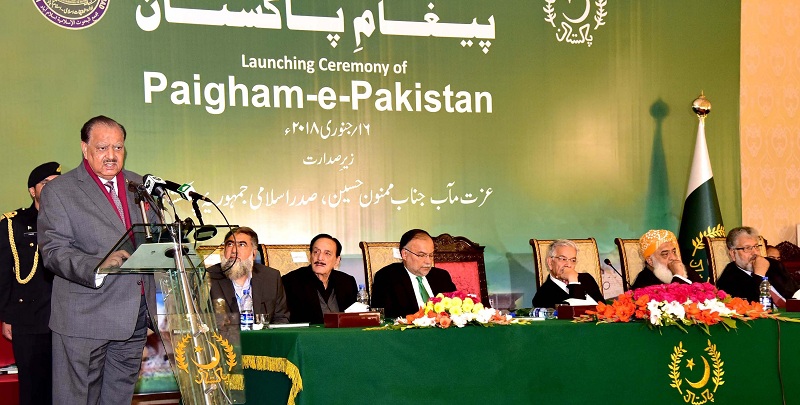
RNA - Last week, some 1,800 Pakistani religious scholars, representing different schools of thoughts, issued a fatwa (religious decree) that declared suicide attacks, armed insurgency against a state and use of force in the name of imposing Shariah law (Islamic law) are forbidden in Islam.
Commenting on the anti-terror fatwa, titled Paigham-e-Pakistan, Abbas Fayaz, a senior political expert on Pakistan issues, told that the radical groups are serving as an apparatus in the hands of Pakistani government to implement its regional policies. However, he added, some of these extremist groups are not on good terms with Islamabad’s intelligence services and even are attracted to the rival Indian and Afghan intelligence agencies and so are not useful to the Pakistani goals and in many cases work against Islamabad’s interests.
According to Mr Fayaz, the recent meeting of the Pakistani religious heads was a completely directed one, organized by the Pakistani government and the intelligence service. The participants, he asserted, were close to the government, with none of them belonging to an independent party. Among others was the Riyadh Hussein group, a Shiite movement being under the government’s supervision and under duress to work with the administration. Independent Shiite groups did not show up in the meeting, he maintained.
The political expert maintained that the participating groups did not mean to condemn groups such as Afghanistan’s Taliban or Lashkar-e-Taiba, or criticize the Haqqani Network’s support for extremism in Afghanistan; rather they abel the militias active Afghanistan as legitimate jihadis, deserving to be backed. One of the guests, he said, was Sami ul Haq, the president of Haqqani madrassa, or officially Darul Uloom Haqqaania, who is a staunch supporter of Taliban group.
The nature of the participants shows that they were struggling to help the Pakistani intelligence services to weather the anti-Pakistani strains coming from the US. For instance, Mawlana Tahir Ashrafi, the chief of All Pakistan Ulema Council, following the meeting in a press interview claimed that ISIS and Lebanon’s Hezbollah both use the suicide attacks and the fatwa majorly is aimed against their actions.
According to the expert, hardline groups such as Afghanistan and Pakistan’s Taliban, as well as the Haqqani Network, were not involved in the Islamabad-sponsored religious alliance. The alliance is an umbrella covering the heads of the madrassas and other religious chiefs with dependence on the Pakistani government. Mawlana Zahid Mahmoud Qassemi, an imam of the All Pakistan Ulema Council, and the chief of Jamia Ashrafia, among other participants, are in tune with the Pakistani intelligence. Mr Fayaz portrayed the recent conference a stunt against the anti-Pakistani sides, like Fazlullah, Taliban’s military leader, or parts of ISIS terrorist group who are majorly Uzbek nationals and sustained harms from the Pakistani army’s operations. This conference only aimed to blast such restricted list of militants.
Mr Fayaz noted that by gathering the Pakistani scholars, the Islamabad leaders were in the quest of religious legitimacy to neutralize the inconsistent and out-of-control radical groups, those who instead of operating in favor of Pakistani government in Afghanistan are waging a war against the Pakistani army at home.
On the other side, the religious meeting came in response to the increasing US pressures which accused Islamabad of being a safe haven for terrorists operating in Afghanistan. The meeting, as Mr Fayaz put it, was Pakistani leaders' efforts to tell the Americans that they are taking the initiative in counterterrorism, instead of allowing their country to be a stronghold of the militias. The Pakistani analyst, however, cast doubt on the practicality of the move, saying that this was, as it is widely known, simply a show and will not much burnish Pakistan’s image and goals.
He maintained that the recent conference and the resultant statement might have brief effects and give the army religious justification to hit the radical opponents, but will not check the actions of the terrorist groups since they do not buy the statement. According to Mr Fayaz, the radicals in Afghanistan are not addressed by the fatwa. Rather, the participating scholars label them jihadis, with right ideologies and objectives, and that the Pakistani government does not want supporting them.
The analyst predicted that the declaration will not turn the tide when it comes to the Pakistani foreign policy. He emphasized that the fatwa serves to prepare the public opinion at home for a military campaign against the anti-government groups operating on the Pakistani soil. Even the regional countries like Afghanistan and India dismissed the statement, according to Mr Fayaz, as no crucial change in Pakistan’s approaches is going to happen after its release.
Source: Alwaght
847/940